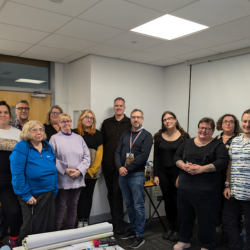-
Study
-
Undergraduate
- Search for a Course
- Undergraduate Open Day & Events
- Application Guides
- Northumbria University UCAS Exhibitions
- Foundation Years
- Undergraduate Fees & Funding
- School & College Outreach
- Continuing Professional Development
-
Postgraduate
- Postgraduate Study Degree
- Postgraduate Research Degrees
- Postgraduate Open Days and Events
- Postgraduate Fees & Funding
- Flexible Learning
- Thinking about a Masters?
- Continuing Professional Development
- Change Direction
-
Student Life
- The Hub - Student Blog
- Accommodation
- Life in Newcastle
- Support for Students
- Careers
- Information for Parents
- Students' Union
- Northumbria Sport
- Be Part of It
-
-
International
International
Northumbria’s global footprint touches every continent across the world, through our global partnerships across 17 institutions in 10 countries, to our 277,000 strong alumni community and 150 recruitment partners – we prepare our students for the challenges of tomorrow. Discover more about how to join Northumbria’s global family or our partnerships.
View our Global Footprint-
Applying to Northumbria
- European Union
- Our London Campus
- Northumbria Pathway
- International Events
- Entry Requirements and Country Representatives
- Regional Offices
-
Northumbria Language Centre
- Faculty Requirements
- Acceptable English Requirements
- Pre-sessional English Language and Study Skills
- Academic Language Skills Programmes (ALS)
-
International Fees, Funding & Scholarships
- International Undergraduate Fees
- International Undergraduate Funding
- International Masters Fees
- International Masters Funding
- International Postgraduate Research Fees
- International Postgraduate Research Funding
- International Money Matters
-
Life at Northumbria
- International student support
- Careers
-
International Mobility
- Current Northumbria Students
- Incoming Exchange Students
-
-
Business
Business
The world is changing faster than ever before. The future is there to be won by organisations who find ways to turn today's possibilities into tomorrows competitive edge. In a connected world, collaboration can be the key to success.
More on our Business Services -
Research
Research
Northumbria is a research-rich, business-focused, professional university with a global reputation for academic quality. We conduct ground-breaking research that is responsive to the science & technology, health & well being, economic and social and arts & cultural needs for the communities
Discover more about our Research -
About Us
-
About Northumbria
- Our Strategy
- Our Staff
- Place and Partnerships
- Student Profiles
- Alumni Profiles
- Leadership & Governance
- Academic Departments
- University Services
- History of Northumbria
- Contact us
- Online Shop
-
-
Alumni
Alumni
Northumbria University is renowned for the calibre of its business-ready graduates. Our alumni network has over 244,000 graduates based in 178 countries worldwide in a range of sectors, our alumni are making a real impact on the world.
Our Alumni - Work For Us
What will I learn on this module?
This module will develop your digital communications skills and understanding. You will be introduced to cutting-edge digital communication tools and will establish an advanced knowledge of these tools and their usage in built environment sector. In doing so, you will enrich your ability to choose and apply appropriate communication techniques within a project cycle. You will also be able to demonstrate your new skills in the design, specification and communication of projects within future learning and professional practice.
How will I learn on this module?
The module is taught through seminars and workshops which will be arranged in 3 blocks across the year. These sessions mainly will take place in IT Labs but time to time, you will be based at the Construction Labs and learning innovative digital tools such as 3D printing and 3D scanning.
Seminars will be used to introduce and discuss the theoretical issues based around digital technologies within built environment and whereas the workshops will provide opportunities to practice and asses the usability of these various digital tools within specific subject area. Learning packs will be provided for each of the diverse skill sets you will need to employ in this module. These packs will be in a variety of formats and may include tutorials, links to tutorials, directed tasks etc. You will experiment during these hand-on sessions in Northumbria’s IT labs, which are fully equipped with the latest industry standard software.
If you are in employment your workplace will be the main learning environment, in effect acting as a framework for digital built environment. However, tutor support will be available via drop-in sessions throughout the module study period. If you are in employment it is recognised that there is the need for modes of blended learning delivery, experiential assessment, and opportunities to combine work and study through independent study, embedded learning opportunities, and relevant communications technologies. Lecture capture will be used to elaborate on the content contained in any teaching material along with audio recording and notes to support presentations on key topics.
How will I be supported academically on this module?
There will be three intensive blocks of study that and these take place within three separate weeks at the start, around the middle and at the end of the module. Students will receive prolonged access to staff during these periods and in-between which contact will be maintained using traditional means and e-learning platforms such as Blackboard and PebblePad, supported by distance learning materials. During workshops and the informal meetings held outside of the core teaching times you will receive formative feedback on your practical skills. The University’s e-Learning portal will also have the learning materials to support the both directed and independent learning.
If you are in employment your workplace will be the main learning environment, however, tutor support will be available via drop-in sessions throughout the module study period. The eLP, telephone and email will be used as a means of communication once the initial briefings have taken place and work-based visits will be made by tutors if appropriate.
What will I be expected to read on this module?
All modules at Northumbria include a range of reading materials that students are expected to engage with. Online reading lists (provided after enrolment) give you access to your reading material for your modules. The Library works in partnership with your module tutors to ensure you have access to the material that you need.
What will I be expected to achieve?
Knowledge & Understanding:
• MLO1: You will develop an understanding of architectural drawings and how to read and produce them.
• MLO2: You will gain awareness of digital technologies in within AEC industry.
Intellectual / Professional skills & abilities:
• MLO3: You will gain efficiencies in information management tools and techniques for the AEC industry.
• MLO4: You will be able to produce subject specific documentations (written or visual) to convey information.
Personal Values Attributes (Global / Cultural awareness, Ethics, Curiosity) (PVA):
• MLO5: You will establish an understanding of digital communication ethics and practices.
How will I be assessed?
There will be both summative and formative assessment in this module and summative assessment has one component: individual digital portfolio.
Formative assessment will be through progress reviews where you will be expected to demonstrate your developing skills and knowledge related to the topics of study. During these reviews, you will receive verbal feedback for you to further develop your digital portfolio (MLO3 and MLO4).
Summative assessment will be via the submission of an individual Digital Portfolio encompassing your progress reviews and evidence of your skills and knowledge in relation to digital communication and technologies. The digital portfolio will be worth (100%) of the module mark and assess MLOs 1-5. Feedback will be offered in verbal and written form which will provide advice for further development and a critical appraisal of work and performance.
Moderation will take place at the end of the module.
Pre-requisite(s)
NA
Co-requisite(s)
NA
Module abstract
Utilising digital communication technologies within built environment sector is a fairly recent concept if we compare these to the established practices like drawing boards, blueprints etc. Acceptance and application of these tools within built environment sector has been slow but as the industry moves towards a more integrated process, the importance and advantages of correct, co-ordinated and managed information is being recognised. In this module, you will be introduced to the fundamental principles of digital tools that can be utilized within built environment sector. This introduction will enable you to develop an understanding of the ways in which different modes of collecting and using digital data within subject specific areas and will help you to make appropriate strategic decisions about digital tools in different situations.
If you are in employment your workplace will act as a framework for digital built environment to develop your skills and knowledge.
Course info
Credits 20
Level of Study Undergraduate
Mode of Study 5 years Part Time
Department Architecture and Built Environment
Location City Campus, Northumbria University
City Newcastle
All information is accurate at the time of sharing.
Full time Courses are primarily delivered via on-campus face to face learning but could include elements of online learning. Most courses run as planned and as promoted on our website and via our marketing materials, but if there are any substantial changes (as determined by the Competition and Markets Authority) to a course or there is the potential that course may be withdrawn, we will notify all affected applicants as soon as possible with advice and guidance regarding their options. It is also important to be aware that optional modules listed on course pages may be subject to change depending on uptake numbers each year.
Contact time is subject to increase or decrease in line with possible restrictions imposed by the government or the University in the interest of maintaining the health and safety and wellbeing of students, staff, and visitors if this is deemed necessary in future.
Useful Links
Find out about our distinctive approach at
www.northumbria.ac.uk/exp
Admissions Terms and Conditions
northumbria.ac.uk/terms
Fees and Funding
northumbria.ac.uk/fees
Admissions Policy
northumbria.ac.uk/adpolicy
Admissions Complaints Policy
northumbria.ac.uk/complaints














